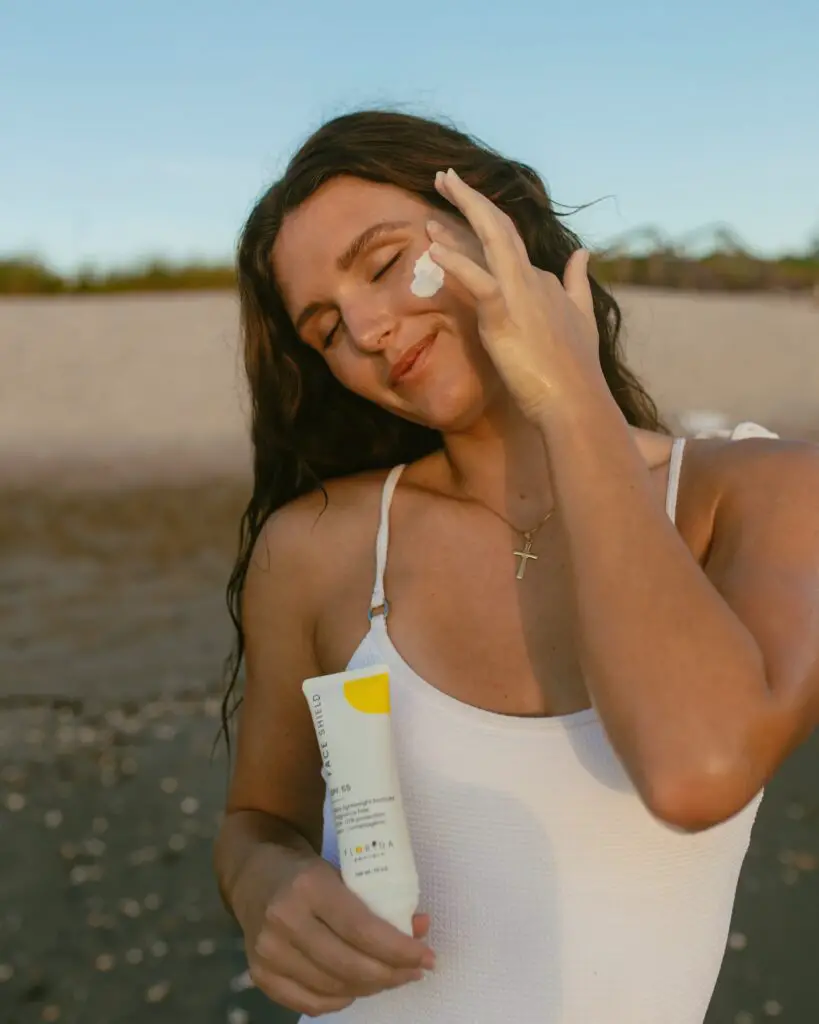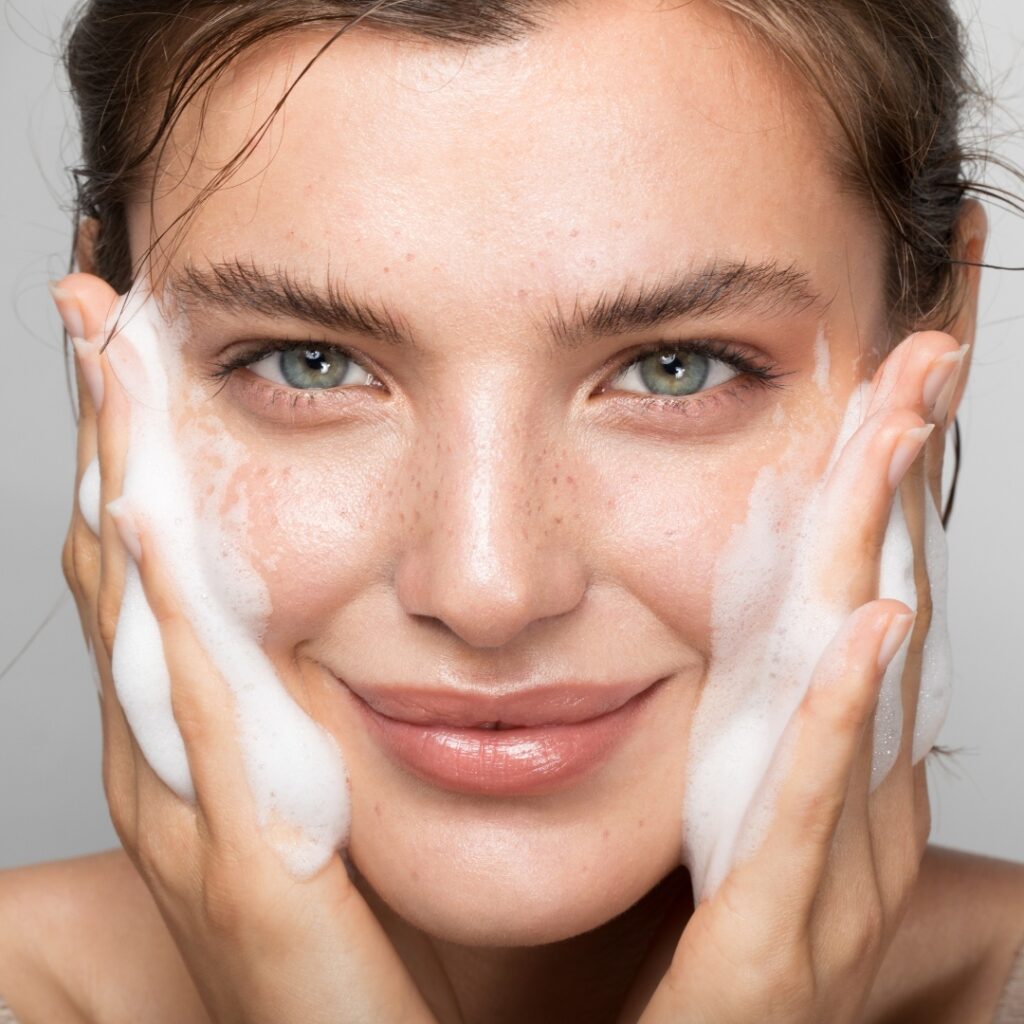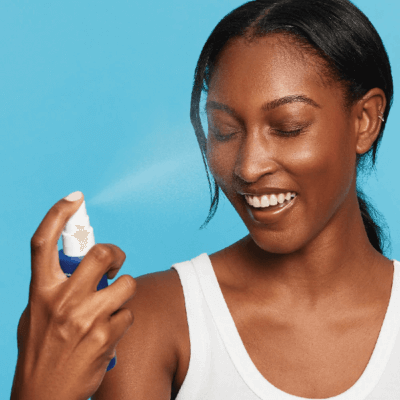For sure, visiting the beach is always an amazing experience; however, the continuous exposure to the sun and sand together with the influence of saltwater cause harm to the skin.
Nevertheless, following a few easy hacks would help ensure that your face remains fresh and glowing during your stay at the beach. This blog explores eight efficient tips to ensure skin protection and freshness during suntan.
Busy? Save this pin for later.
1. Hydrate, Hydrate, Hydrate!
Staying hydrated is crucial for maintaining healthy skin, especially when you’re exposed to the sun. Drinking plenty of water before, during, and after your beach trip is essential.
Hydration not only keeps you feeling refreshed, but it also helps your skin stay supple and moisturized.
To ensure optimal hydration, consider carrying a water bottle with you and setting reminders to drink water regularly.
You Might Also Like: 10 Simple Ways To Naturally Make Your Skin Glow
2. Apply Sunscreen Regularly
Sunscreen is your best friend when it comes to protecting your face from harmful UV rays. It’s important to choose a broad-spectrum sunscreen with at least SPF 30 and apply it generously to your face before heading out to the beach.
Since reapplication is also important, one should reapply the sunscreen every 2 hours or immediately after swimming to provide continuous protection.
Furthermore, other characteristics such as water resistance and sweat resistance contribute to whether the product can remain on the skin even when exposed to high humidity or movements.
Do not forget to use sunscreen on all the exposed areas including the ears, neck, or other areas that may be exposed to the sun.
3. Don’t Forget Your Hat and Sunglasses
In addition to applying sunscreen, wearing a wide-brimmed hat and sunglasses with UV protection is essential for shielding your face from direct sunlight.
Aside from complimenting your beach outfit, they also offer additional skin coverage to avoid sunburns and further lower your chances of getting an early age.
Hats should have a broad brim for maximum shading of your face, neck, and shoulders. On the other hand, glasses should have a 100% UV protection ability to protect your eyes and the skin around them.
4. Use Lightweight and Breathable Makeup
Although full face makeup to the beach is appealing, it is advisable to keep it light and natural. The reason is that heavy makeup can clog your pores and make your skin more prone to breakouts.
Therefore, go for a lightweight makeup product, such as tinted moisturizers or BB creams, to allow your skin to breathe freely while evening out the skin tone.
Moreover, choose products specifically labeled “non-comedogenic” or “oil-free” to minimize the likelihood of clogged pores. Since the heavy foundation or powder can melt or cake, it is better to avoid them.
Finish your makeup with a touch of waterproof mascara and lip balm with SPF to give your beach-ready look an extra flair.
You Might Also Like: 9 Easy Ways to Achieve a Natural Glow
5. Cleanse and Exfoliate Before and After
Before hitting the beach, it’s crucial to cleanse your face thoroughly to remove any dirt, oil, or debris that may have accumulated.
Use a gentle cleanser suitable for your skin type and follow it up with an exfoliating scrub to get rid of dead skin cells. This pre-beach routine helps create a clean canvas for your sunscreen and prevents pore-clogging.
After your beach outing, repeat the cleansing and exfoliating routine to keep your face fresh and rejuvenated. Exfoliation helps remove any residual sunscreen, salt, or sand from your skin, allowing it to breathe and regenerate properly.
Follow up with a hydrating toner and a moisturizer to replenish lost moisture and restore your skin’s balance.
6. Moisturize, Moisturize, Moisturize!
Sun, wind, and saltwater can leave your skin feeling dry and dehydrated. To combat this, make sure to moisturize your face regularly with a lightweight, non-comedogenic moisturizer.
Pick a product perfect for your last-minute hydration
Make sure your choice does not clog your pores so your skin can breathe freely. You can pick the product with hyaluronic acid, glycerin, and ceramides – this way, you will ensure your skin retains moisture and keeps its barrier function strong.
If your skin is fairly sensitive – opt for the fragrance-free or hypoallergenic one. Do not forget you need to hydrate your neck and decolletage!
7. Use a Refreshing Face Mist
A face mist can work wonders in keeping your face cool and hydrated while at the beach. Look for a mist that contains soothing ingredients like aloe vera or cucumber extract.
You can also spritz it on your face, whenever you need quick refreshment since you will immediately feel the cooling.
If you are on your way to the beach, you can also put your face mist in the fridge for extra refreshment. These small sprays keep your skin hydrated and help with the redness and skin irritation caused by the sun.
Put a small bottle in your beach bag and use it to freshen up throughout the day.
8. Stay in the Shade During Peak Hours
The sun’s rays are strongest between 10 AM and 4 PM. To minimize sun exposure and protect your face, try to stay in the shade during these peak hours.
Find a cozy spot under an umbrella or a beach tent, and take breaks from direct sunlight. This will not only help keep your face fresh but also reduce the risk of sunburns and skin damage.
If you plan to spend prolonged periods in the sun, consider using additional forms of sun protection, such as UV-protective clothing or a beach hat with a neck flap.
Moreover, such additional defensive measures will serve as hype shields from harmful UV rays, ensuring full-body and face protection.
Summing up, using all the above-mentioned eight hacks you will have your beach vacation fun and your face safe and radiant. The advice to practice frequent hydration sun protection and skincare activities are relevant. In addition, with the proper care and moisturizing efforts, getting a facial tan would be safe and enjoyable.
You Might Also Like: Debunking Common Skin Care Myths With Facts












Leave a Reply
You must be logged in to post a comment.